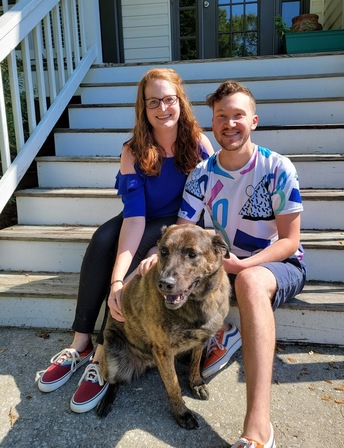AIMEE BROWN
CAPSTONE
Capstone Project Committee: Sat Gupta, Ph.D.; Terrance McConnell, Ph.D.; Randi Stewart, M.S., CGC; Sara Wienke, M.S., CGC
Background: α1-antitrypsin deficiency (AATD) is one of the most common metabolic disorders in those with Northern European descent. Affected individuals are predisposed to emphysema as adults and liver disease throughout the lifetime. Previous studies have not adequately measured the impact that testing minors for this condition has had on these individuals’ health behaviors or psychosocial concerns. The goal of this research project was to assess the possible impacts, both positive and negative, of testing children for this condition and inform the discussion concerning the potential addition of AATD to newborn screening.
Methods: Participants were recruited from two research registries and were asked to complete a single anonymous survey. Participants were eligible for this study if they were currently 18 years of age or older, had genetic testing for AATD prior to age 18, and were English proficient. Survey questions were developed based on review of the literature. Self-esteem was assessed using the Rosenberg Self-Esteem Scale. Frequencies and independent t-tests were used to analyze the data.
Results: A total of 28 eligible responses were received. Most of the respondents reported having severe deficiency (12 of 28) or moderate deficiency (12 of 28). Respondents who did not have an experience with AATD in their family reported that AATD testing results affected their career choice more than those who did have experience with AATD in their family. Those who had their results disclosed by a healthcare provider had lower self-esteem than those who had their results disclosed by their parents. No respondents disagreed with the statement that AATD should be added to newborn screening tests. However, 11 respondents suggested a better time in life when testing should occur.
Discussion: More positive impacts of testing minors for AATD were reported than negative impacts. Many respondents reported that they were glad they had testing and would pursue testing in their children. There was not universal agreement among this population that AATD should be added to newborn screening tests for the general population.
Since Graduation

Following graduation from UNCG in 2014, Aimee joined the clinical genetic counseling team at the University of Alabama at Birmingham. She worked in a variety of specialities including hereditary cancer, general pediatrics, craniofacial disorders, connective tissue disorders, and cardiogenetics. After 4 years at UAB, she accepted a remote position at InformedDNA with the Utilization Management department. She is entering her fourth year at InformedDNA and is now part of the Clinical Algorithms team, working to codify health plan policies and create an automated process for utilization management. It’s been a new and rewarding challenge! She is enjoying the work-from-home life and the flexibility it brings! She continues to have involvement with the Genetic Counseling Training Program at UAB and gives an annual lecture about utilization management.
On a personal note, Aimee and her husband bought their first home this year in Birmingham (and in the middle of a pandemic)! They look forward to getting back to enjoying everything the city has to offer. They share their new home with their pup, Dutchess, and cat, Arya.
